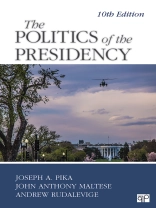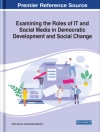The most up-to-date coverage and analysis of the presidency
Never losing sight of the foundations of the political office, The Politics of the Presidency maintains a balance between historical context and contemporary scholarship on the executive branch, providing a solid foundation for any presidency course. In the highly anticipated Tenth Edition of this bestseller, Pika, Maltese, and Rudalevige thoroughly analyze the change and continuity in the presidency during President Trump′s first term, his relations with Congress and the judiciary, the outcomes of the 2018 midterm election, and the competitive setting for the 2020 presidential race.
Содержание
Tables and Figures
Preface
About the Authors
Part I: The President and the Public
Chapter 1: The Changing Presidency
The Scope of Presidential Power
Expansion of the Presidency
Popular Expectations
Conclusion: The Changeable, Political Presidency
Suggested Readings
Resources on the Web
Notes
Chapter 2: Election Politics
Evolution of the Selection Process
Defining the Pool of Eligibles
Competing for the Nomination
The National Convention
The General Election
Validation
Conclusion: Transitions to Governing
Suggested Readings
Resources on the Web
Notes
Chapter 3: Public Politics
Public Attitudes toward the Presidency
Rallying Public Support
delete — The President and the Media
Conclusion: The Permanent Campaign
Suggested Readings
Notes
Chapter 4: Presidential Character and Performance
Determinants and Evaluations of Performance
What Manner of Person?
Psychological Characteristics of U.S. Presidents
Management Styles of Modern Presidents
Understanding Presidents: Barack Obama and Donald J. Trump
Conclusion: Seeking Presidential Success
Suggested Readings
Resources on the Web
Notes
Part II: The President and the Government
Chapter 5: Legislative Politics
Three Confrontations in Interbranch Relations
Development of the President′s Legislative Role
The Presidential-Congressional Relationship
The President′s Formal Legislative Powers
The President′s Informal Legislative Influence
Explaining Presidents’ Legislative Success
Congressional Oversight
Conclusion: Legislating Together
Suggested Readings
Notes
Chapter 6: Executive Politics
The President as Executive
The President and the Executive Branch
The President and the Cabinet
The Vice President
The First Lady
Presidential Control of the Bureaucracy
Presidential Management of the Bureaucracy
Conclusion: The Frustrating Search for Control
Suggested Readings
Resources on the Web
Notes
Chapter 7: Judicial Politics
Presidential Appointment of Federal Judges
Other Presidential Influences on the Federal Courts
Judicial Oversight of Presidential Action
Conclusion: A Balancing Act
Suggested Readings
Notes
Part III: The President and Public Policy
Chapter 8: The Politics of Domestic Policy
The Domestic Policy Process
The Domestic Policy Environment
The Domestic Policy Apparatus
Conclusion: Providing Policy Leadership
Suggested Readings
Notes
Chapter 9: The Politics of Economic Policy
Macroeconomic Policy
Microeconomic Policy
Presidents and the Economy: 1933–2019
delete — The Politics of Macroeconomic Policymaking
The Economic Subpresidency
Presidents and Economic Policy Coordination
Congress′s Role in Macroeconomic Policy
Conclusion: Avoiding Economic Disorder
Suggested Readings
Resources on the Web
Notes
Chapter 10: The Politics of National Security Policy
Issues in National Security Policy: Search for a New Consensus
The Problem with National Security Policymaking
The President, Congress, and National Security
Organizing and Managing National Security
Conclusion: Limiting the Exercise of Power
Suggested Readings
Notes
Chapter 11: An Embattled, Defiant President
Setting the Stage for 2020
Assessing Trump as President: Harbinger or Aberration?
A Stress Test for Madisonian Institutions
Notes
Appendices
Index
Об авторе
Andrew Rudalevige is the Thomas Brackett Reed professor of government at Bowdoin College and former chair of the American Political Science Association’s Presidentsand Executive Politics section; in 2023-2024 he is a visiting professor at the London School of Economics. He holds a Ph D from Harvard University and won the Richard E. Neustadt Prize from the American Political Science Association for best book on the U.S. presidency in 2003 and 2022, as well as the 2022 Louis Brownlow Prize from the National Academy of Public Administration. His books include By Executive Order, Managing the President’s Program, The New Imperial Presidency: Renewing Presidential Power after Watergate, and, as coeditor, a volume on the Office of Management and Budget and a series assessing recent presidencies. Prior to his academic career, heworked in state and local politics in Massachusetts.












